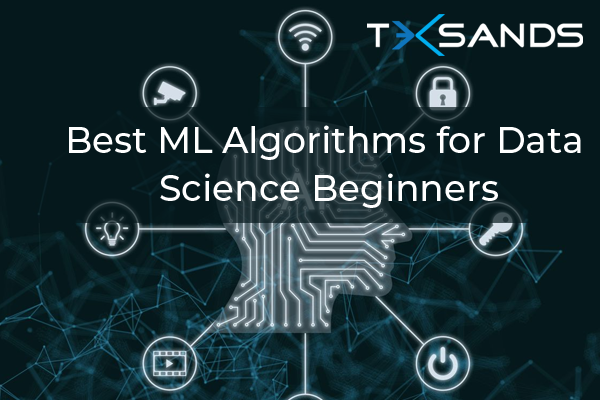
Best ML Algorithms for Data Science Beginners

Ever since the highly prestigious Harvard Business Review, in their wildly popular 2012 article, listed ‘Data Scientist' as the ‘Sexiest Job of the 21st Century', interest in the field skyrocketed beyond proportion. Such was the impact of the erstwhile article, that in the days to follow, the domain of data science and machine learning would not only experience an unprecedented windfall in the form of fresh technology graduates and seasoned IT professionals, but would also go on to find widespread application in a host of diverse industries across the globe.
In the current scheme of things, where data, as an entity, has increasingly come to be accepted as the newest and most potent form of currency out there, the interest in the field has but only grown. Thus, the fact that data science jobs stand as the most sought after in this day and age comes as a surprise to none. However, even with its coterie of lucrative prospects and limitless possibilities, for the uninitiated, breaking into the scene might be a little bit of a hassle. Without the right guidance, and the necessary resources at their disposal, an individual might find it very difficult to pave a sustainable career path for themselves in this particular field.
What are Machine Learning Algorithms?
Getting themselves acquainted with the various machine learning algorithms in practice is a mandatory starting point for all machine learning beginners and data science enthusiasts out there. At the outset, machine learning algorithms are defined as programs that can absorb information from data and subsequently improve themselves from experience without resorting to human intervention of any kind.
These learning tasks might be varied in nature. Starting from tasks that involve learning the function which charts the input to the output, to cases of ‘instance-based learning’ wherein a class label is generated for a new instance by comparing it to previous instances of the training data that are already present in the memory. It is important to note here that instance-based learning does not give rise to an abstraction from particular instances. Thus, before beginners begin their hunt for a machine learning live course in India, it is advised that they acquire at least a preliminary idea of these algorithms.
Types of Machine Learning Algorithms
Broadly, there exists three categories of machine learning algorithms out there. They have been listed below for the reader’s reference.
- Supervised Learning Algorithms- Supervised learning algorithms make use of labelled training data to learn the mapping function which in turn allows users to accurately generate outputs corresponding to a particular set of given inputs. Supervised learning can further be classified into two types- classification and regression. Classification generally comes into use when one has to predict the result of a given sample in cases where the output variable exists in the form of categories. On the other hand, when output variable exists in the form of real values, regression comes into the picture.
- Unsupervised Learning Algorithms- Unsupervised learning algorithms are utilised only when the user is exclusively in possession of the input variables and has no corresponding output variables. These algorithms make use of unlabelled training data to model the fundamental structure of the data. As was in the case of supervised learning algorithms, unsupervised learning algorithms also draw further classifications into three categories. They are Association, Clustering, and Dimensionality Reduction.
- Reinforcement Learning- These machine learning algorithms allow the user to determine the most suitable next course of action on the basis of their current state. It does so by learning behaviours that will maximise a reward. In the majority of cases, reinforcement algorithms learn optimal actions through the mechanism of trial and error.
Now that we are familiar with the fundamental classification of machine learning algorithms, let us discuss a few of the best algorithms that are most conducive for beginners. All the best online courses for machine learning out there invariable revolve around these algorithms.
Linear Regression
The fundamental goal of a machine learning algorithm is to quantify the relationship that exists between the input and output variables of a given problem statement. Linear regression achieves so by plotting this relationship in the form of a straight-line equation. Predictions, in problems that make use of the linear regression algorithm, occurs in continuous values.
Logistic Regression
Contrary to linear regression where predictions take place in the form of continuous values, in the case of logistic regression a transformation function is utilised to yield these predictions in the form of discrete values. Logistic regression works best in those problem statements that involve binary classification. The inherent objective of logistic regression is to make use of the training data in such a manner such that the error between the predicted outcome and the actual outcome is reduced to a bare minimum.
K-Means
K-means is a kind of unsupervised and iterative algorithm that groups similar data into clusters. As a result, it helps users to find all those groups that haven't already been explicitly labelled in the data. One of the major advantages of using the K-means algorithm is that it helps you identify unknown groups in complex data sets.
Why choose Teksands?
Teksands bank of deep learning online courses as well as online courses on data analytics in India stand to not only amp up the preparations of a budding data scientists and machine learning enthusiasts but also mould them in perfect alignment with industry standard needs and requirements. With the vision of creating Deep Tech experts in the industry, Teksands is increasingly committed to its vision of dishing out quality Deep Tech education by roping in top professionals who possess solid industry experience.










